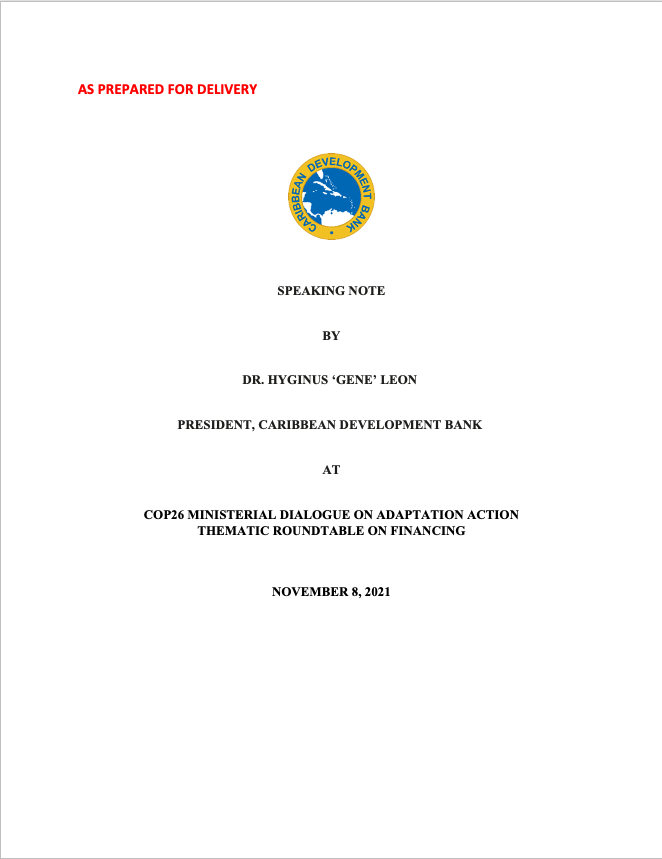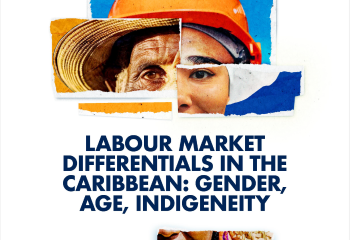COP26 Ministerial Dialogue on Adaptation Action Thematic Roundtable on Financing

Excellences, Distinguished Delegates, Ladies and Gentlemen
Today, I’d like to speak to three issues:
First, how do we build confidence for the future? The international community has to fulfill its existing commitments to deliver on their USD100 billion per year commitment. Not only are we falling short, but we must rapidly work toward establishing a more ambitious climate finance target to take effect starting in 2025, especially because the world appears on track for reaching 2.7 degrees Celsius of warming, which would result in an intensification of the risks small island developing and vulnerable states are already confronting.
With only 25% of flows so far going to adaptation and with priorities in national developed contributions overwhelmingly emphasising adaptation needs, Small Island Development States (SIDS) are falling behind, yet, have no choice but to adapt to climate change now.
- Given current debt sustainability challenges in the Caribbean, it is therefore crucial that we identify and pursue innovative approaches to help scale up public sector investment. This is why the Caribbean Development Bank (CDB) is advocating that developed countries re-allocate just 2% of their latest Special Drawing Rights (SDR) allocation, which can be combined with SDRs already allocated to SIDS, to enable them to invest in adaptation at scale, despite the significant impact that the COVID-19 pandemic has had on public debt levels.
- The private sector should also play a key role in scaling up climate finance. We see a/the need for instruments to facilitate the de-risking of investment opportunities for the private sector, which has ample capital. One option is the development of contingent and variable-return instruments that can ring-fence future catastrophic events and incentivise the implementation of reforms through the repricing of financing conditional on implementation of reforms, including specific adaptation investments.
Second, what are the biggest hurdles vulnerable nations face?
- The identification and development of bankable project proposals. We need human and financial resources to support project identification, design, and development, which are therefore of paramount importance.
- Availability and access to reliable climate data and information to show how projects will respond to climate change rather than climate variability — namely, to address gaps in impact-based forecasting. Indeed, we need to measure better to target better. CDB is proposing development of a recovery duration adjuster to provide a resilience-adjusted measure of Gross National Income (GNI) as a means to unlocking lower-cost and more concessionary finance for environmental resilience.
Third, what concrete strategies should the international community pursue?
- We need to crowd-in the private sector to focusing on shared national and regional objectives. We must emphasise the use of partial loan guarantees, first loss guarantees, and other innovative instruments to de-risk private sector investment opportunities. This finance should be targeted at unlocking considerable low-cost financing for investments that enhance the resilience of our region’s coastal infrastructure, water systems, and the building of transportation and sustainable energy opportunities that are vital to our social and economic development and well-being.
- Adopt clear and concrete policy guidance for and improve delivery of programmatic approaches to climate financing already pursued by multilateral funds like the Green Climate Fund and the Adaptation Fund.
- Enhance reliability and approval timing of climate finance flows to facilitate the unlocking of additional investment by the public and private sectors. Why? The ad hoc nature of many climate finance flows results in a sub-optimal allocation of the resources at the programme and project levels. In addition, the review and approval timelines, which vary dramatically, result in challenges for planned co-financing, sometimes derailing programmes and/or projects altogether.
Excellencies, Ladies and Gentlemen, I thank you.


